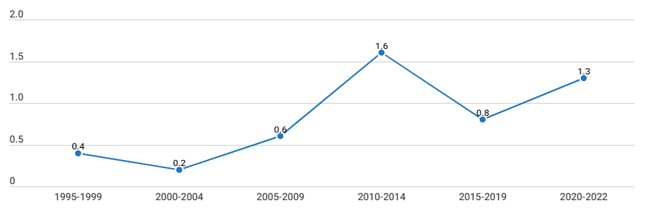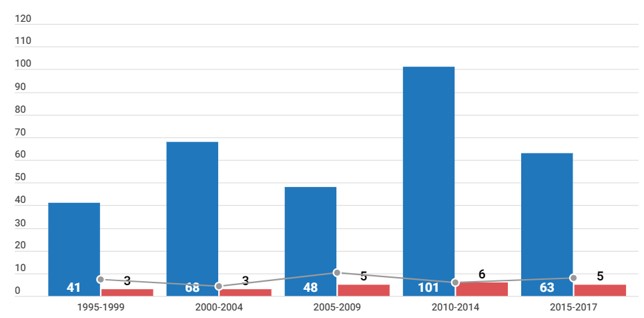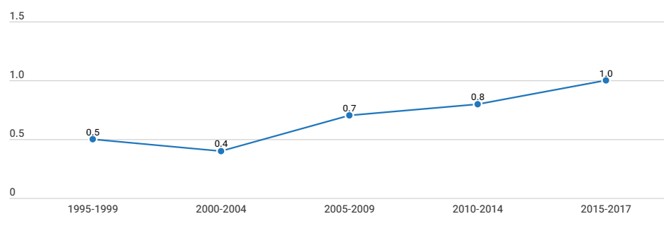How Often Does the Supreme Court Invalidate Legislation?
In recent years, there have been attempts to enact the “override clause” in Israel, a legal provision that would enable the Knesset to override the Supreme Court’s rulings in cases in which it strikes down legislation. This week the Constitution, Law and Justice Committee is discussing a draft of such a law.

In recent years, there have been attempts to enact the “override clause” in Israel, a legal provision that would enable the Knesset to override the Supreme Court’s rulings in cases in which it strikes down legislation. This week the Constitution, Law and Justice Committee is discussing a draft of such a law.
One of the arguments presented by supporters of the override clause is that it is necessary in light of the court's judicial activism in striking down legislation, which they claim is more common in Israel than in other countries. We present an overview of the situation and show that there is no factual basis for this claim. The Supreme Court does not invalidate legislation frequently in comparison with Supreme Courts worldwide. Moreover, there are indications that in recent years, the Court has become even more cautious in striking down legislation.
There are many substantive arguments as to why there is no place for the override clause, given the State of Israel’s constitutional makeup, and the role played by Basic Laws in protecting minority groups from the tyranny of the majority. We do not intend to deal with this issue in the context of this overview, nor will we discuss the question of the Supreme Court’s judicial activism in other contexts, such as intervention in ministers’ or government ministries’ decisions. The focus of this overview is on refuting one of the claims put forward by supporters of the override clause – that is, the Supreme Court’s activism in striking down legislation enacted by the Knesset.
Frequency of Invalidation of Legislation – A Thirty -Year Analysis
Since 1992, when the Basic Laws empowered the Supreme Court to exercise judicial review, and since the 1995 United Mizrahi Bank ruling when Court recognized this, the courts have invalidated legislation in 22 cases. In other words, from 1995 until November 2022, the frequency in which the courts invalidated legislation stands at about 0.8 per year.
Figure 1: Number of Supreme Court rulings invalidating legislation
Figure 2: Frequency of Supreme Court rulings invalidating legislation

At first glance, it appears that the frequency of invalidating laws has been on the rise over time. However, when analyzed in comparison with the number of petitions submitted to the Supreme Court to invalidate legislation, we see that the rate of petitions that are accepted per year has not increased, and has actually decreased slightly relative to the years 2005 - 2009. This decrease stems from the fact that the number of petitions seeking to invalidate laws has risen sharply, from 10 petitions per year until 2010 (in the years 2005-2009) to about 20 petitions per year in the years 2010 – 2017.
Figure 3: Rate of successful petitions to invalidate legislation (%)

Key (blue) Number of petitions submitted
(orange) Accepted petitions out of total petitions submitted (in absolute numbers)
(grey line) Rate of accepted petitions out of total petitions submitted (in %)
Source: Data received from Courts following a request under the Freedom of Information law
An additional parameter relevant to evaluating whether the frequency of invalidations is high or low, is to compare the number of invalidations with the average annual number of laws passed by the Knesset. Assuming that the number of laws involving constitutional issues remains constant, then as the number of new laws increases, so do the number of petitions to invalidate laws - and the number of successful petitions would also be expected to increase. However, in practice, the average number of laws passed by the Knesset annually, rose from about 110 in the years 1995-2000 to about 150 laws in the years 2010-2017. In this context, it is interesting to note that the percentage of court rulings invalidating legislation rose from about 0.5% per period until 2004, to about 0.7% in years 2005-2009, remained constant until 2014, and in the years 2015-2017 rose to about 0.96%. Concurrently, elected officials have become less likely to accept legal advice to amend or withdraw bills that are constitutionally problematic. This tendency may explain the slight increase in the percentage of the modest rise in the percentage of rulings invalidating laws.
Figure 4: Rate of successful petitions to invalidate legislation to legislation passed in the Knesset

Source: Ministry of Justice, Legislation report (2018)
To sum up, judicial activism regarding invalidation of legislation as a percentage of the number of petitions is not increasing. In fact, the data could lead to the conclusion that the Courts are becoming more cautious in invalidating legislation.
International Comparison
As stated above, as of November 2022, the Supreme Court invalidated legislation at a rate of approximately 0.8 times a year (22 times in 28 years). If we focus on the period since 2008, the frequency is 1.13 times a year.
An additional parameter for evaluating whether this frequency is high or low, is to compare it with Supreme Courts in five other countries that share the same common principles on legislation.
Table 4: International Comparison
We chose to compare Israel with Supreme Courts in other countries who share a common legal practice. In choosing the periods for comparison, we tried, as far as possible, to examine comparable periods to those in Israel. However, we were limited by the data published by foreign courts or by reliable judicial literature.
The international comparison on the frequency of invalidation of legislation per year reveals that the Israeli Supreme Court does not strike down laws at a higher rate than other Supreme Courts in the world. In fact, since 1995, the rate of invalidation in Israel is the lowest of all the other countries we examined.
It should be noted that there are methodological difficulties in an international comparison of this kind. First, the frequency of invalidation depends on the number of petitions for invalidation that are submitted, and on the number of laws that are passed per year and that are perceived to be problematic. Our comparison does not take this data into account. However, the Israeli Supreme Court is unusual in the large number of cases over which it presides and the scope of legislation in Israel is larger than almost all the countries we examined, except for the United States.
Table 5: Frequency of invalidations per year – an international comparison
An additional methodological issue relates to the fact that judicial authority to review and criticize legislation differs from country to country. For example, in Great Britain, the courts do not invalidate legislation, but rather declare it incompatible, and it is usually amended by Parliament. In Canada, the constitution includes an “override clause”, but it is only used at the provincial level and not at the federal level.
These methodological problems make it difficult for us to draw unequivocal conclusions. Nevertheless, Figure 5 shows that there is no basis for making the converse argument – that, in comparison to other countries, the Supreme Court in Israel invalidates legislation more frequently, or that it is particularly active in striking down legislation, a claim made by supporters of the override clause. Quite the contrary, the data shows that the Supreme Court is cautious in invalidating legislation.
Summary
This brief review refutes one of the arguments used to justify passing the override clause in Israel. Supporters of this clause claim that the Supreme Court takes an activist approach in striking down legislation. The data from the international comparison and from a 30-year review reveals that the Supreme Court in Israel does not invalidate many laws, when compared to the courts we examined in different countries, and that the frequency of invalidation is not increasing relative to the number of petitions for invalidation submitted every year. Based on the above, it is very difficult to justify the override clause – that only exists in a few other countries – in reaction to the accusation of judicial activism by the Supreme Court.
